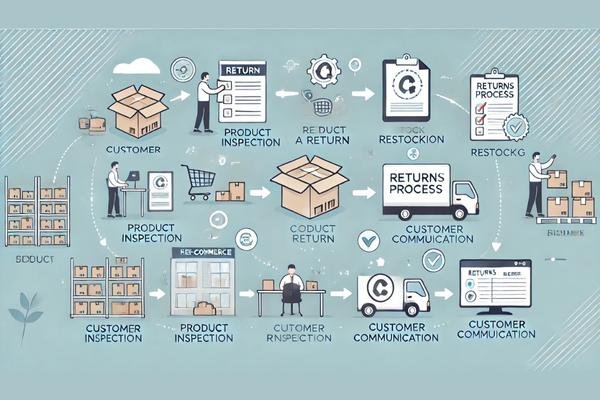
Top Online Store Platforms for Your Business Needs
October 2, 2024
Top 5 Online Store Platforms for Small Businesses in 2025
October 2, 2024How to Choose the Best Online Store Platform for E-Commerce
Choosing the right online store platform is one of the most critical decisions you’ll make when starting or scaling your e-commerce business. With countless options available, the process can feel overwhelming. However, selecting the best online store platform tailored to your business needs is essential for a smooth, efficient, and scalable operation. In this guide, we’ll walk you through the important factors to consider, key features to look for, and strategies to ensure you make the right decision.
Table of Contents
1. Understanding Your Business Needs
Before diving into the myriad of platforms available, it’s essential to clarify your business goals and needs. What type of products are you selling? Are you focusing on physical goods, digital downloads, or perhaps services? Different platforms cater to different needs, so having a clear understanding of your requirements will help narrow your options.
1.1 Assessing Your Business Model
Your choice of platform will heavily depend on your business model. For example, if you’re operating a dropshipping business, platforms like Shopify may be ideal due to their integration with suppliers. On the other hand, if you’re running a content-heavy e-commerce site, a platform like WooCommerce may better suit your needs with its content management system (CMS) flexibility.
Tip: Make a list of your business model requirements to help guide your platform selection.
1.2 Scalability and Growth Projections
As your business grows, so will your e-commerce needs. A platform that suits a startup might not be the best fit for a business scaling into multiple regions or expanding its product offerings. Shopify Plus, for instance, caters to high-growth businesses with advanced scalability features.
1.3 Budget and Pricing Considerations
Different platforms come with varying pricing models—some charge monthly fees, others may have transaction fees, and some offer free versions but require paid add-ons. It’s crucial to balance your budget with the features you need.
Popular Platforms to Consider:
- Shopify: Ideal for ease of use and beginner-friendly but comes with monthly costs and transaction fees.
- WooCommerce: Free and open-source but requires hosting and additional expenses for themes and plugins.
- BigCommerce: No transaction fees, robust features, and great for scaling businesses.
2. Key Features to Look for in an Online Store Platform
Now that you’ve assessed your business model and budget, let’s dive into the core features that any good e-commerce platform should provide.
2.1 Ease of Use
A user-friendly interface is crucial, especially if you’re not a developer. Drag-and-drop builders like those offered by Shopify and Squarespace allow business owners to create an attractive online store without coding experience. If your store requires heavy customization, platforms like Magento or WooCommerce offer more flexibility but may require developer assistance.
2.2 Customization Options
Customization is essential for branding. Does the platform allow you to create a unique customer experience? Platforms like WooCommerce and Magento offer a high level of customization, while more user-friendly platforms like Shopify may be more limited but provide enough design flexibility through their themes and plugins.
2.3 Mobile Optimization
With mobile commerce booming, your e-commerce platform must be mobile-optimized. Most modern platforms offer responsive designs, but it’s essential to ensure that the platform you choose provides mobile-friendly checkout processes and product displays.
2.4 Payment Gateway Integration
Your platform should integrate with multiple payment gateways to give customers flexibility during checkout. Most e-commerce platforms, like BigCommerce and Shopify, support a wide range of payment processors, including PayPal, Stripe, and Square.
2.5 SEO Capabilities
SEO is critical for driving organic traffic to your store. Platforms like WooCommerce and Magento offer comprehensive SEO features, such as customizable URLs, metadata, and sitemaps. Platforms with poor SEO capabilities can limit your store’s growth.
3. Integrations and Third-Party Tools
The best e-commerce platforms offer integrations with third-party tools that enhance your store’s functionality. These tools can range from email marketing platforms to inventory management systems.
3.1 Email Marketing and CRM Integration
If you’re running email campaigns or managing customer data, your platform should integrate seamlessly with email marketing and CRM tools like Mailchimp, Klaviyo, or HubSpot. Shopify, for instance, has a wide range of CRM and marketing tool integrations that help automate and optimize customer communication.
3.2 Analytics and Reporting
Data is vital for making informed decisions. Most platforms, such as BigCommerce and WooCommerce, come with built-in analytics, but you may also want third-party integrations for more advanced tracking. Tools like Google Analytics can be connected to almost any e-commerce platform for deeper insights.
4. Security and Compliance
With data breaches becoming more frequent, ensuring that your platform offers top-notch security is essential. You’ll want to look for platforms that provide SSL certificates, PCI compliance, and multi-layered security protocols to protect both you and your customers.
4.1 PCI Compliance
PCI compliance is a standard for protecting credit card information. Platforms like Shopify and BigCommerce handle PCI compliance for you, ensuring that your store meets security standards out of the box.
4.2 Backup and Data Recovery
Make sure the platform has a reliable backup and recovery system. Some platforms offer automatic backups, while others might require third-party apps or plugins to manage this.
5. Customer Support and Community
When you encounter issues with your e-commerce platform, timely and efficient customer support is crucial. Platforms like Shopify are known for 24/7 support, while others, like WooCommerce, may rely more on their community forums for help.
5.1 Dedicated Support
Consider whether the platform offers phone, chat, or email support. Shopify’s robust 24/7 customer service stands out in this category, while Magento and WooCommerce typically offer support through third-party developers and community forums.
5.2 Community and Forums
A strong user community can be an invaluable resource. Open-source platforms like WooCommerce and Magento often rely on their large communities for support and plugin development.
6. Comparing the Top E-commerce Platforms
Let’s break down some of the most popular platforms to see which might be the best fit for your business.
6.1 Shopify
- Best for: Beginners, dropshippers, and small to mid-sized businesses.
- Pros: Easy setup, extensive app store, 24/7 support.
- Cons: Transaction fees unless using Shopify Payments, limited customization compared to open-source platforms.
6.2 WooCommerce
- Best for: Businesses looking for full customization and using WordPress.
- Pros: Free, highly customizable, large community.
- Cons: Requires hosting, plugins, and more technical knowledge.
6.3 BigCommerce
- Best for: Growing businesses looking for a scalable solution.
- Pros: No transaction fees, multi-channel selling, robust features.
- Cons: Slightly steeper learning curve for beginners.
6.4 Magento
- Best for: Large enterprises or businesses with a developer team.
- Pros: Highly scalable and customizable.
- Cons: Expensive and requires significant technical expertise.
How to Choose the Best Online Store Platform for E-Commerce Comparaison
How to Choose the Best Online Store Platform
| Platform | Best For | Key Features | Pricing | Link |
|---|---|---|---|---|
| Shopify | Small to medium-sized businesses |
– Drag-and-drop editor – 24/7 support – Multi-channel selling | Starts at $29/month | Visit Shopify |
| WooCommerce | Businesses using WordPress |
– Open-source and customizable – Large plugin library – SEO-friendly | Free (additional costs for hosting and plugins) | Visit WooCommerce |
| BigCommerce | Growing businesses |
– No transaction fees – Advanced SEO tools – Multi-channel selling | Starts at $29.95/month | Visit BigCommerce |
| Magento | Large enterprises |
– Highly scalable – Extensive customization – Robust analytics | Varies (significant setup and hosting costs) | Visit Magento |
Frequently Asked Questions
1. What is the best online store platform for small businesses?
The best platform for small businesses is usually Shopify, as it offers an easy setup, intuitive interface, and various tools to get your store up and running quickly.
2. How do I integrate payment gateways into my online store?
Most platforms, including Shopify and WooCommerce, offer easy integration with major payment gateways like PayPal, Stripe, and Square through built-in options or third-party plugins.
3. Can I migrate my online store to a different platform later?
Yes, many platforms offer migration services, but it’s essential to research the process ahead of time to avoid data loss or downtime. WooCommerce, Shopify, and BigCommerce all support migrations, but the complexity will depend on the size of your store and data.
Conclusion
Choosing the best online store platform for your business involves weighing factors like ease of use, scalability, customization, SEO capabilities, and cost. Platforms like Shopify and WooCommerce cater to different types of businesses, from small startups to large enterprises. Ultimately, the right platform for your business will depend on your goals, budget, and technical expertise. Be sure to assess your long-term needs before making a final decision, and keep in mind that the right platform will grow alongside your business.








